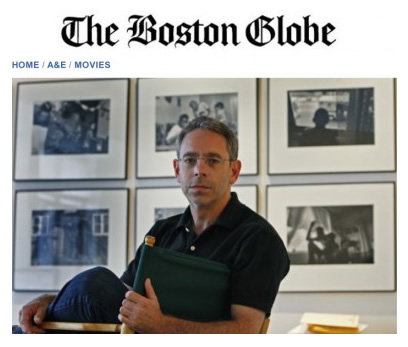Making Moving Pictures
Globe Staff / July 26, 2009
There are photojournalists who do a story, and it’s over and on to the next one.
Then there are photojournalists for whom the story is never over.
This would include Boston photographer David Binder. He likes to let stories play out, sometimes over the course of many years. And it’s been 21 years, so far, for the work he calls “The Gail Story,’’ a series of powerful photo essays about Gail Farrow, a Boston woman who died at 29 after contracting HIV from a transfusion. She left behind her four young sons and their father, Ronald Watson.
But her death in 1989 didn’t mean the end of the story. Binder has stayed in touch with Watson and his boys and has continued to document their lives – and at times, what seemed to be the unraveling of them – after the woman central to them was gone. He published two photo essays at 10-year intervals, the first in In Health magazine in 1990, the second in Life magazine in 1998. His photos were the centerpiece of a national traveling exhibition called “What About AIDS?’’ sponsored by the Centers for Disease Control and Prevention.
“There was nothing bigger than AIDS in the ’80s,’’ Binder said. “My interest then and now with any story is a sense of journalism: recording the events of our time.’’
Now he’s ready with another update, but this time in film. His first documentary, “Calling My Children,’’ will have its Boston debut at the Roxbury Film Festival Aug. 1 and 2. It combines many of his early photos with recent video of Watson and his sons, continuing to reveal the impact of the life and loss of Farrow.
Video is a big departure for Binder, 47, who’s been a diehard print journalist since he moved from Michigan to Boston 22 years ago, working briefly at The Boston Globe in the mid-1980s and segueing into a successful freelance career. His clients have included People, Paris Match, Life, Forbes, Fortune, and Business Week.
But as the print industry has gone into freefall, Binder’s clients have cut back or closed down and he finds fewer opportunities to publish long-form journalism. So he decided to switch media. “I miss journalism quite a bit – very, very much – but I see there are more outlets for documentary film,’’ said Binder, interviewed in his South End apartment and studio. “My interest is in harnessing this medium to continue to get my stories out to the world.’’
He hired a film crew, including a director of photography, but shot some of the film himself, teaching himself as he went along. “It reminded me of the experience of picking up the camera for the first time when I was 13,’’ he said. “It was exhilarating. It was a whole new adventure.’’
Working with a crew also reminded him of his former life in the print world. “I love teamwork and collaboration,’’ said Binder, who directed “Calling My Children.’’ “Part of what I miss about journalism is the ability to work with a writer and editor as a team.’’
The result definitely bears his stamp as a print photographer, incorporating more than 100 of his photos and the lingering, penetrating eye of a photojournalist.
The 36-minute documentary retraces Farrow’s story from the time Binder met her about 18 months before she died until about six months later, then continuing on with Watson and their sons, now all young men. He spent a year and a half with Farrow and her family, rarely missing a day. Her situation was grave; she had had cervical cancer in 1983 which required hospitalization and blood transfusions, and she became infected that year.
But Farrow, who lived in Mission Hill, gave Binder full access to her life and family, in part because “on a deep, intimate level, her interest was in leaving something for her children,’’ he said. “I knew, and was the vehicle for that.’’
The film is less an AIDS story than one about bereavement and loss, as Watson struggles to rebuild his life and keep his family together. Much of it is told through the eyes of Watson, now 53, living in Randolph, and an assistant teacher in the Boston public schools. Gail herself is present in the film, in the form of two letters she wrote to her family shortly before she died, read by her boys and by Watson.
“I’ve tried to teach you to be good boys,’’ she said in a letter she dictated to a hospital social worker. “I am asking you now to be the best you can be. I know you will be great people because you were loved from the moment you were born.’’
The story is far from over, but as is often the case with life, her hopes have not completely squared with reality. But Binder’s mission was not to deliver a happy ending.
“It’s about the relationships we have with each other, how we each process loss, how our character is developed through the incidents in our lives,’’ he said. “It’s in the classical tradition of bearing witness and of the documentary work that I consider journalism to be.’’
“Calling My Children’’ will be screened Aug. 1 at 2:15 p.m. at the Museum of Fine Arts; and Aug. 2 at 1:30 p.m. at Wentworth Institute of Technology. To see a trailer, go to www.callingmychildren.com.
The film is part of the 11th Roxbury Film Festival, which runs July 30-Aug. 2 in four venues around the city and is cosponsored by ACT Roxbury and The Color of Film Collaborative.
